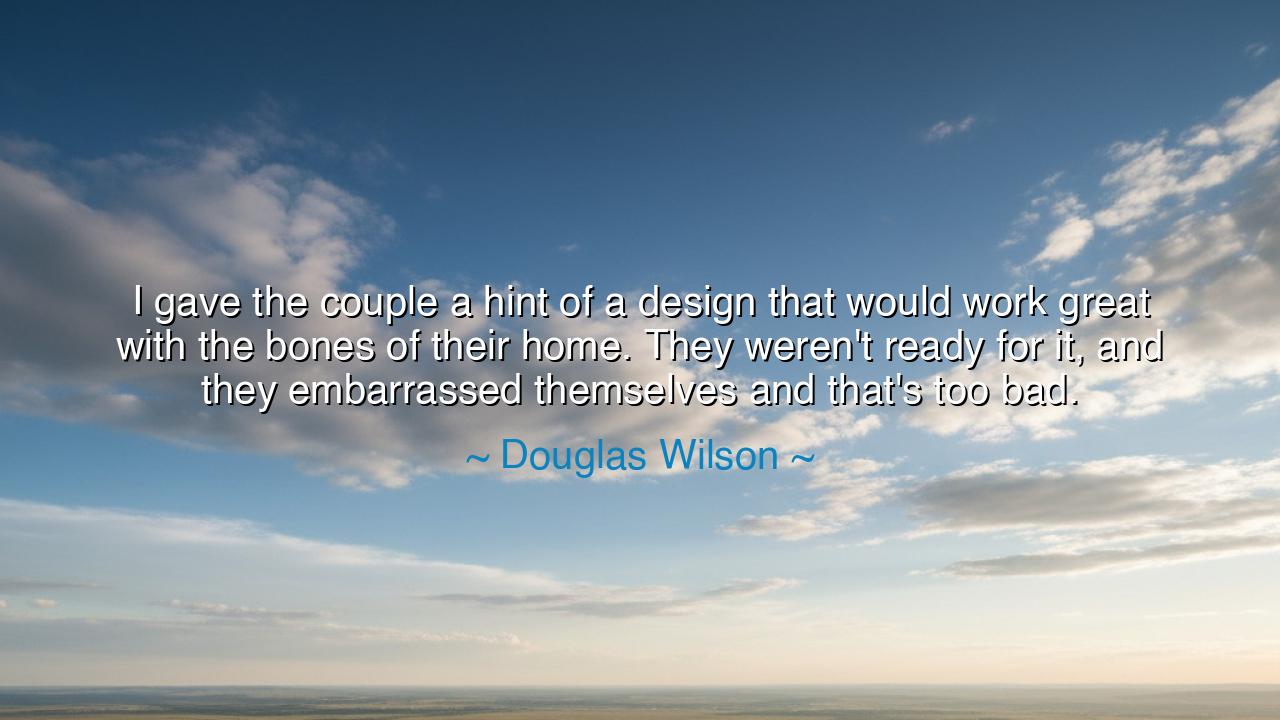
I gave the couple a hint of a design that would work great with
I gave the couple a hint of a design that would work great with the bones of their home. They weren't ready for it, and they embarrassed themselves and that's too bad.






In the words of Douglas Wilson, we hear a lament disguised as wisdom: “I gave the couple a hint of a design that would work great with the bones of their home. They weren't ready for it, and they embarrassed themselves and that's too bad.” These words speak not merely of architecture, but of the deeper architecture of the soul—of how we receive guidance, how we confront truth, and how often pride blinds us to beauty that could have been ours. Beneath the sharp edge of his statement lies a timeless lesson: that not all who are offered vision are prepared to see it. To be ready for greatness requires humility, patience, and faith in the wisdom of another.
Long ago, in the golden age of Athens, there lived a sculptor who dreamed of carving a statue to honor Athena. A wandering philosopher, aged and poor, saw his early sketch and whispered, “Give her eyes that see the heavens, not the earth.” The sculptor dismissed him, thinking the old man senile. When at last the statue was unveiled, the people called it lifeless, its gaze too narrow, its spirit absent. In shame, the artist realized that he had rejected divine counsel cloaked in humble form. Like the couple in Wilson’s tale, he was not ready for the design that would have honored both his art and his city’s soul. And so he, too, embarrassed himself—not before others alone, but before the truth of his own potential.
Douglas Wilson’s words are not merely those of a designer speaking of decor. He speaks the ancient language of alignment—the harmony between form and essence, between the bones of a home and the spirit that dwells within it. Every dwelling has its character, just as every human heart has its destiny. To design against that truth is to wage war with nature itself. A wise craftsman listens to what the walls whisper, what the light desires, what the foundation remembers. The couple, in their blindness, refused this harmony. They desired to impose their will upon the bones, rather than honor what was already beautiful within. Thus, they built not a home, but a monument to their ego.
In this, we find a universal truth: many are offered guidance, but few are humble enough to accept it. The prophets of all ages, from Confucius to Socrates, spoke of the folly of pride. The unready heart sees correction as insult, suggestion as intrusion. But the wise see every offering of wisdom as a mirror reflecting what they have yet to learn. How often, even in our own lives, do we reject the voice that seeks to guide us—whether it comes from a mentor, a friend, or even a whisper of intuition within? And later, when failure humbles us, we see that the advice we scorned was the key to the very door we sought to open.
Yet Wilson’s tone is not merely judgment—it carries sorrow, too. When he says, “That’s too bad,” he speaks like an elder who has seen potential wasted through impatience. It is the sigh of every teacher who has watched a student abandon wisdom for pride, every parent who has seen a child stumble where they might have soared. There is both compassion and finality in his words, for once a lesson is refused, time itself must teach it again—and time is never gentle. This is why the ancients said, “Those who do not listen to their elders must feel with their bones.”
The story of unheeded wisdom repeats through the centuries. When the great city of Pompeii stood before the mountain, some priests warned of the trembling earth. But the citizens laughed—believing their marble temples eternal. The mountain answered with fire. Their homes, their art, their lives—all turned to ash. Even so, the bones of their city remained, whispering a lesson for the ages: heed the signs; honor what is real; do not let pride make you deaf to wisdom.
Let this be the teaching passed down to future generations: When a master offers a vision, pause and listen. Even if it confounds you, even if it wounds your pride, look deeper. For sometimes the truth that unsettles you is the very truth that will set you free. The bones—whether of a house, a dream, or a soul—already carry the blueprint of greatness. Your task is not to overwrite it, but to understand it.
And so, my child, walk humbly with those who see more than you do. When wisdom knocks, do not close the door because its face is unfamiliar. When correction comes, do not turn away because it stings. For those who are ready will grow, and those who are not will wither beneath their own stubbornness. As Wilson reminds us, it is a tragedy when beauty is offered but pride refuses to receive it. Learn, then, to listen—not with your ears alone, but with the bones of your being.






AAdministratorAdministrator
Welcome, honored guests. Please leave a comment, we will respond soon